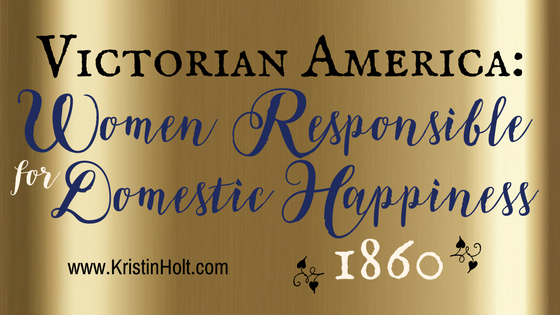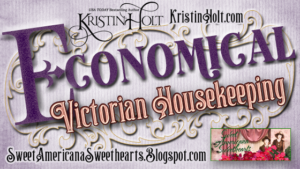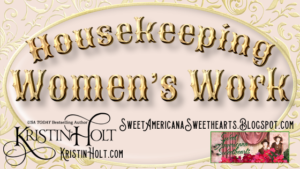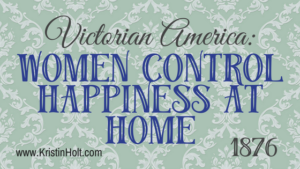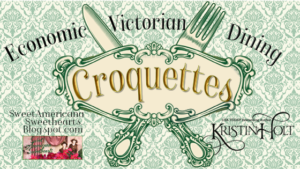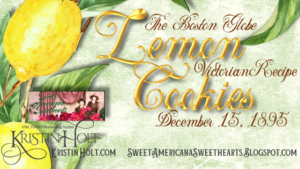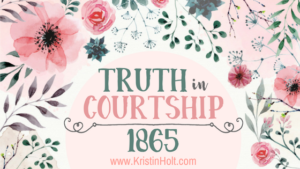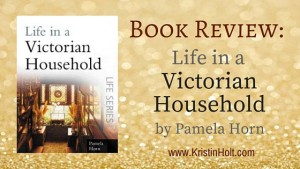Victorian America: Women Responsible for Domestic Happiness (1860)
.
Victorian America: Women Responsible for Domestic Happiness (1860)
.
One hundred and fifty-seven years ago today, August 23, 1860, the following article, “Truths for Wives” was published in Kansas National Democrat of Lecompton, Kansas. As designed, the content informs wives (and not-yet wed young ladies) of the importance of their designated work. This sample is a characteristic of prevailing Victorian-era attitudes. While a prime example of the widespread mores of the nineteenth century in America, the attitudes are shocking when compared to today’s view of women and “women’s work.” It’s true. In Victorian America, Women (were) responsible for Domestic Happiness. At least in 1860.
.
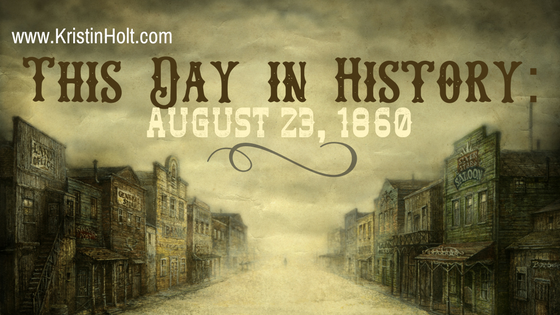
.
TRUTHS FOR WIVES.–In domestic happiness, the wife’s influence is much greater than her husband’s; for the one, the first cause–mutual love and confidence–being granted, the whole comfort of the household depends upon trifles more immediately under her jurisdiction. By her management of small sums her husband’s respectability and credit are created or destroyed. No fortune can stand the constant leakages of extravagance and mismanagement; and more is spent in trifles, than women would easily believe. The one great expense, whatever it might be, is turned over and carefully reflected on ere incurred, the income is prepared to meet it; but it is pennies imperceptibly sliding away which do the mischief; and the wife alone can stop–for it does not come within man’s province.
.
There is often unsuspected trifles to be saved in every household. It is not in economy alone that the wife’s attention is so necessary, but in those niceties which make a well-regulated house. An unfurnished cruet stand, a missing key, a button-less shirt, a soiled tablecloth, a mustard pot with its old contents sticking hard and brown about it, are severally nothings; but each can raise an angry word or cause discomfort. Depend on it, there’s a great deal of domestic happiness in a well-dressed mutton chop, or a tidy breakfast table.
.
Quick Break
.
Who’s chaffed a little by this? Twenty-first century women will argue that a well-dressed mutton chop and tidy breakfast table have NOTHING to do with domestic happiness. A full stomach, perhaps. But marital bliss?
Bear with me. Victorian-era newspaper columns tend to have very long paragraphs.
.
Men grow sated of beauty, tired of music, are often too wearied for conversation–however intellectual–but they can always appreciate a well swept hearth and smiling comfort. A woman may love her husband devotedly–may sacrifice fortune, friends, country for him–she may have the genius of a Sappho, the enchanted beauties of an Armida; but–melancholy fact–if with these she fail to make his house comfortable, his heart will inevitably escape her. And woman live so entirely in the affections, that without love their existence is a void. Better submit, then, to household tasks, however repugnant they may be to your tastes, than doom yourself to a loveless home. Women of a higher order of mind will not run this risk; they know that their feminine, their domestic, are their first duties.
.
~ Kansas National Democrat of Lecompton, Kansas on August 23, 1860
.
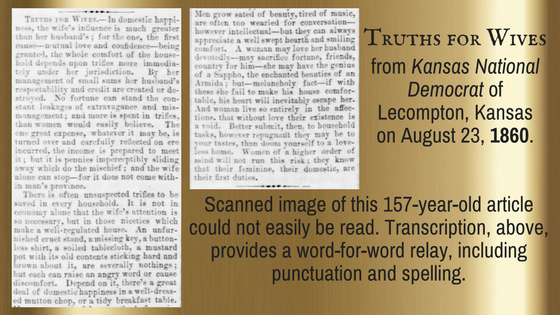
Scanned image of fully transcribed article, immediately above. Image not intended to be large enough to read; scanned image is not easily read.
.
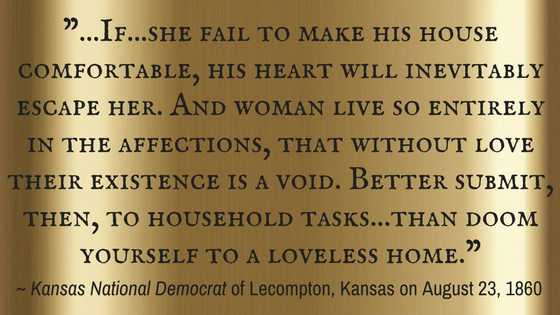
Quote from “Truths for Wives” from Kansas National Democrat of Lecompton, Kansas, on August 23, 1860. Note the Victorian-era American belief that a woman won her husband’s love by ensuring his comfort at home. This attitude extended to the belief that if turmoil or contention reigned at home, such was also the woman’s doing…and she bore the responsibility and consequences.
.
I’ve read American Historical Romances where much of the conflict between the hero and heroine came from this 19th century expectation–that if the man’s not happy with his wife, it’s her doing. She could have won his love, had she made him comfortable at home, made his income stretch far enough, kept things (routines, foods, etc.) the way he wants them, and thus secured domestic felicity. Looking through today’s lens, the Victorian-era attitudes are degrading, abrasive, and asking for a fight.
.
Historians Agree
.
Allow me to add one more reference to underscore “Women’s Role is in The Home” Victorian-American beliefs. I enjoyed listening to a descriptive and colorful “chapter” or “class” in Lecture 7: The Skeptic’s Guide to American History.
Check it out! It’s worth a thorough listen.
.
Invitation
.
Have you read Historical Romance (Victorian, Regency, Revolutionary era, etc.) where the couple (courtship or marriage) suffered with significant conflict (necessary in all good books), specifically cast as the woman’s inability to meet her man’s expectations with the household?
Please– scroll down and reply with author and/or title. Readers love recommendations!
.

.
Related Articles
.
.
Updated February 2021
Copyright © 2017 Kristin Holt LC

